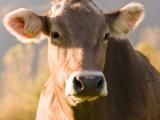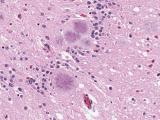Jul 25, 2003 (CIDRAP News) – Following up on an announcement made last week, the Canadian government yesterday published new regulations designed to keep materials potentially contaminated with the bovine spongiform encephalopathy (BSE) agent out of the food supply.
Health Canada announced rules requiring the removal of all "specified risk materials" (SRM) from cattle carcasses at the time of slaughter. SRM are tissues that, in BSE-infected animals, are likely to carry the infective prion protein. The agency defined SRM as the skull, brain, trigeminal ganglia (nerves attached to the brain), eyes, tonsils, spinal cord, and dorsal root ganglia (nerves attached to the spinal cord) in cattle aged 30 months or older, plus the distal small intestine in cattle of all ages.
The regulations take effect Aug 23, but the Canadian Food Inspection Agency (CFIA) will require federally registered establishments to begin removing SRM from carcasses immediately, Health Canada said. The agency also announced a ban on the sale or importation of food products containing SRM.
The move is the first policy change stemming from the discovery of mad cow disease in an Alberta cow in May. The discovery triggered a massive investigation, which turned up no further cases, and prompted the United States and many other countries to ban Canadian beef imports. An international team of veterinary experts that reviewed Canada's response to the BSE case recommended a ban on SRM as the most important public health step to minimize the possibility of BSE contamination in food.
Consumption of food containing prion proteins from BSE-infected cattle is thought to be the cause of variant Creutzfeldt-Jakob disease, the human equivalent of BSE (mad cow disease).
Canada's decision to require the removal of SRM from carcasses triggered speculation that the United States would consider following suit, given that the two nations have taken a similar approach to BSE prevention. US Department of Agriculture officials have signaled that that's a possibility, but no announcement has been made to date. The United States has had no known cases of BSE.
See also:
Canadian Food Inspection Agency's BSE site
Jul 24 CIDRAP News story with additional background information
















